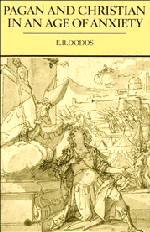 Pagan and Christian in an Age of Anxiety
Pagan and Christian in an Age of Anxiety FOREWORD BY HENRY CHADWICK
Published online by Cambridge University Press: 01 June 2011
Summary
Eric Robertson Dodds (1893–1979) was an Ulsterman from County Down and a man of many parts. A Fenian, a poet (friend of Yeats and Eliot, intimate with Auden and MacNeice), a lifelong rebel against authority who nevertheless ended by becoming an authority himself, holding the Regius Professorship of Greek at Oxford, 1936–60. From that august chair he taught and wrote for a fascinated audience and readership on Euripides' Bacchae and Plato's Gorgias. Lectures in California made his best known work, The Greeks and the Irrational (1951). All these studies were marked by the very modern questions that he put to the ancient texts, influenced by anthropological investigations of shame and guilt. One of his earliest interests remained a lifelong passion – the study of Plotinus and the Neoplatonists, with whom some of the best early Christian thinkers found themselves in deep sympathy.
The present book, Pagan and Christian in an Age of Anxiety, is not only a learned and important study of the things that pagans and Christians of the time shared in common, but also almost a self-portrait of Dodds himself, ironic, austere, humane, illuminating, and of his puzzled reaction to his own age of anxiety. The reader often feels that the unity of the book comes more from the author's mind than from the evidence presented. Another account of the same period might produce far more inconsistencies.
- Type
- Chapter
- Information
- Pagan and Christian in an Age of AnxietySome Aspects of Religious Experience from Marcus Aurelius to Constantine, pp. ix - xPublisher: Cambridge University PressPrint publication year: 1965


